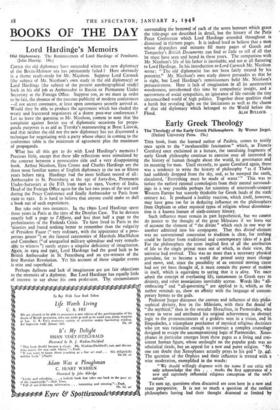BOOKS OF THE DAY
Lord Hardinge's Memoirs
Old Diplomacy. The Reminiscences of Lord Hardinge of Pcnshurst. (John Murray. -18s.) COULD the old diplomacy have succeeded where the new diplomacy of the Bevin-Molotov era has persistently failed ? Here obviously is a theme ready-made for Mr. Nicolson. Suppose Lord Carnock (the subject of Mr. Nicolson's own study in the old diplomacy) or Lord Hardinge (the subject of the present autobiographical study) back in his old job as Ambassador to Russia or Permanent Under Secretary at the Foreign Office. Suppose too, as we must in order to be fair, the absence of the raucous publicity :of modern conferences —if not secret covenants, at least open covenants secretly arrived at. Would they be able to produce the agreement which has eluded the weary and frustrated negotiators of a dozen post-war conferences ? Let us leave the question to Mr. Nicolson, content to note that "the complaint against Soviet use of diplomatic occasions for propa- ganda purposes is as _old as Trotsky's manoeuvring at Brest Litovsk, and that neither the old nor the new diplomacy has yet discovered a technique for negotiating with a party whose object in coming to the conference table is the minimum of agreement plus the maximum of propaganda.
What has all this got to do with Lord Hardinge's memoirs ? Precious little, except that these idle reflections were stimulated by the contrast between a provocative title and a very disappointing book. Arthur Nicolson, Eyre Crowe and Charles Hardinge are the three most familiar names of English diplomacy in the ten or fifteen years before 1914. Hardinge had the most brilliant record of all: Ambassador to St. Petersburg at the age of forty-five, Permanent Under-Secretary at the F.O. from 1906 to two, Viceroy of India, Head of the Foreign Office again for the last two years of the war and during the Peace Conference and finally Ambassador to Paris from 1920 to 1922. It is hard to believe that anyone could make so dull a book out of such experiences.
But take only two instances. In the 189os Lord Hardinge spent three years in Paris at the time of the Dreyfus Case. Yet he devotes exactly half a page to rAffaire, and less than half a page to the preliminaries of the Fashoda Crisis. To have lived in Paris in the 'nineties and found nothing better to remember than the vulgarity of President Faure (" very ordinary, with the appearance of a pros- perous grocer ") or the funeral ceremonies of Marshals MacMahon and Canrobert ("of unequalled military splendour and very remark- atile to witness ") surely argues a singular deficiency of imagination. Again, in 1904 and 1905, Lord Hardinge had the good luck to be British Ambassador in St. Petersburg and an eye-witness of the first Russian Revolution. Yet his account of these singular events is trite and superficial.
Perhaps dullness and lack of imagination are not fair objections to the memoirs of a diplomat. But Lord- Hardinge has equally little of interest to say about his own profession. The circumstances
surrounding the bestowal of each of the seven honours which grace the title-page are described in detail, but the history of the Paris Peace Conference which Lord Hardinge attended throughoUt is dismissed in thirteen pages. It is indeed hard to believe that a man whose dispatches and minutes fill many pages of Gooch and Temperley's British Documents can find so little to tell of all that he must have seen and heard in these years. The comparison with Mr. Nicolson's life of his father is inevitable, and not at all flattering to Lord Hardinge. In his introduction to-Lord Carnock Mr. Nicolson wrote: " The old diplomatist has not been fairly treated by his posterity." Mr. Nicolson's own study almost persuades us that he. is right, but Lord Hardinge's reminiscences belie Mr. Nicolson's persuasiveness. 'Here is lack of imagination in all its unattractive woodenness, unredeemed this time by sympathetic insight, and a' narrowness of social sympathies, an ignorance of life outside the tiny circumscribed world of high politics. Together these qualities shed a harsh but revealing light on the limitations as well as the charm of that old diplomacy which belonged to the World before the, Flood. ALAN BULLOCK.






































 Previous page
Previous page